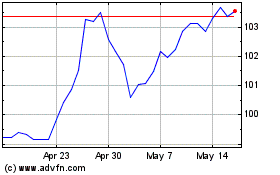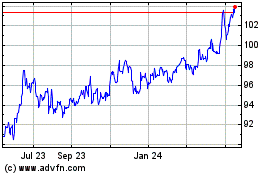Antipodean Currency's Slide Amid Risk Aversion
November 13 2024 - 9:21PM
RTTF2
The Antipodean currencies such as the Australia and the New
Zealand dollars weakened against their major currencies in the
Asian session on Thursday, as traders fretted about the impact of
U.S. President-elect Donald Trump's proposed tariffs on inflation
and interest rates. The U.S. dollar also strengthened against major
currencies in the region.
There is some uncertainty about the likelihood of future rate
cuts after U.S. consumer price inflation data came in line with
estimates. CME Group's FedWatch Tool is currently indicating an
82.3 percent chance of another quarter point rate cut in December
but a 60.2 percent chance rates will then be left unchanged in
January.
In economic news, the unemployment rate in Australia came in at
a seasonally adjusted 4.1 percent in October, the Australian Bureau
of Statistics said on Thursday - unchanged from the previous month
and in line with expectations. The Australian economy added 15,900
jobs, which missed forecasts for an increase of 25,200 jobs
following the addition of 64,100 in September.
Full-time employment increased by 9,700 to 10,037,700 people,
while part-time employment increased by 6,200 to 4,499,800 people.
The participation rate was 67.1 percent, shy of expectations for
67.2 percent - which would have been unchanged. Monthly hours
worked increased to 1.972 billion.
In the Asian trading today, the Australian dollar fell to nearly
a 3-1/2-month low of 0.6460 against the U.S. dollar, more than a
2-month low of 0.9053 against the Canadian dollar and a 1-week low
of 1.6318 against the euro, from yesterday's closing quotes of
0.6485, 0.9076 and 1.6286, respectively. If the aussie extends its
downtrend, it is likely to find support around 0.63 against the
greenback, 0.88 against the loonie and 1.65 against the euro.
Against the yen, the aussie edged down to 100.73 from
yesterday's closing value of 100.81. The aussie may test support
near the 99.00 region.
The NZ dollar fell to nearly a 3-1/2-month low of 0.5854 against
the U.S. dollar, from yesterday's closing value of 0.5879. The next
possible downside support for the kiwi is seen around the 0.57
region.
Against the euro and the Australian dollar, the kiwi dropped to
3-day lows of 1.8007 and 1.1049 from yesterday's closing quotes of
1.7958 and 1.1025, respectively. If the kiwi extends its downtrend,
it is likely to find support around against the 1.83 against the
euro and 1.11 against the aussie.
The kiwi edged down to 91.29 against the yen, from Wednesday's
closing value of 91.39. On the downside, 89.00 is seen as the next
support level for the kiwi.
The U.S. dollar rose to more than a 1-year high of 1.0534
against the euro and more than a 3-month high of 1.2673 against the
pound, from yesterday's closing quotes of 1.0563 and 1.2703,
respectively. If the greenback extends its uptrend, it is likely to
find resistance around 1.03 against the euro and 1.25 against the
pound.
Against the yen and the Swiss franc, the greenback climbed to
nearly a 4-month high of 156.15 and 0.8879 from Wednesday's closing
quotes of 155.45 and 0.8859, respectively. The greenback is likely
to find resistance around 158.00 against the yen and 0.89 against
the franc.
The greenback advanced to nearly a 4-1/2-year high of 1.4020
against the Canadian dollar, from yesterday's closing value of
1.3996. On the upside, 1.41 is seen as the next resistance level
for the greenback.
Looking ahead, Eurozone flash GDP estimate for the third quarter
and industrial production figures for September are due to be
released in the European session.
At 7:30 am ET, the European Central Bank publishes the account
of the monetary policy meeting of the Governing Council held on
October 16 and 17. At the meeting, the bank had reduced the key
interest rates by 25 basis points.
In the New York session, U.S. jobs data for October, PPI for
October and U.S. EIA crude oil data are slated for release.
AUD vs Yen (FX:AUDJPY)
Forex Chart
From Nov 2024 to Dec 2024

AUD vs Yen (FX:AUDJPY)
Forex Chart
From Dec 2023 to Dec 2024
